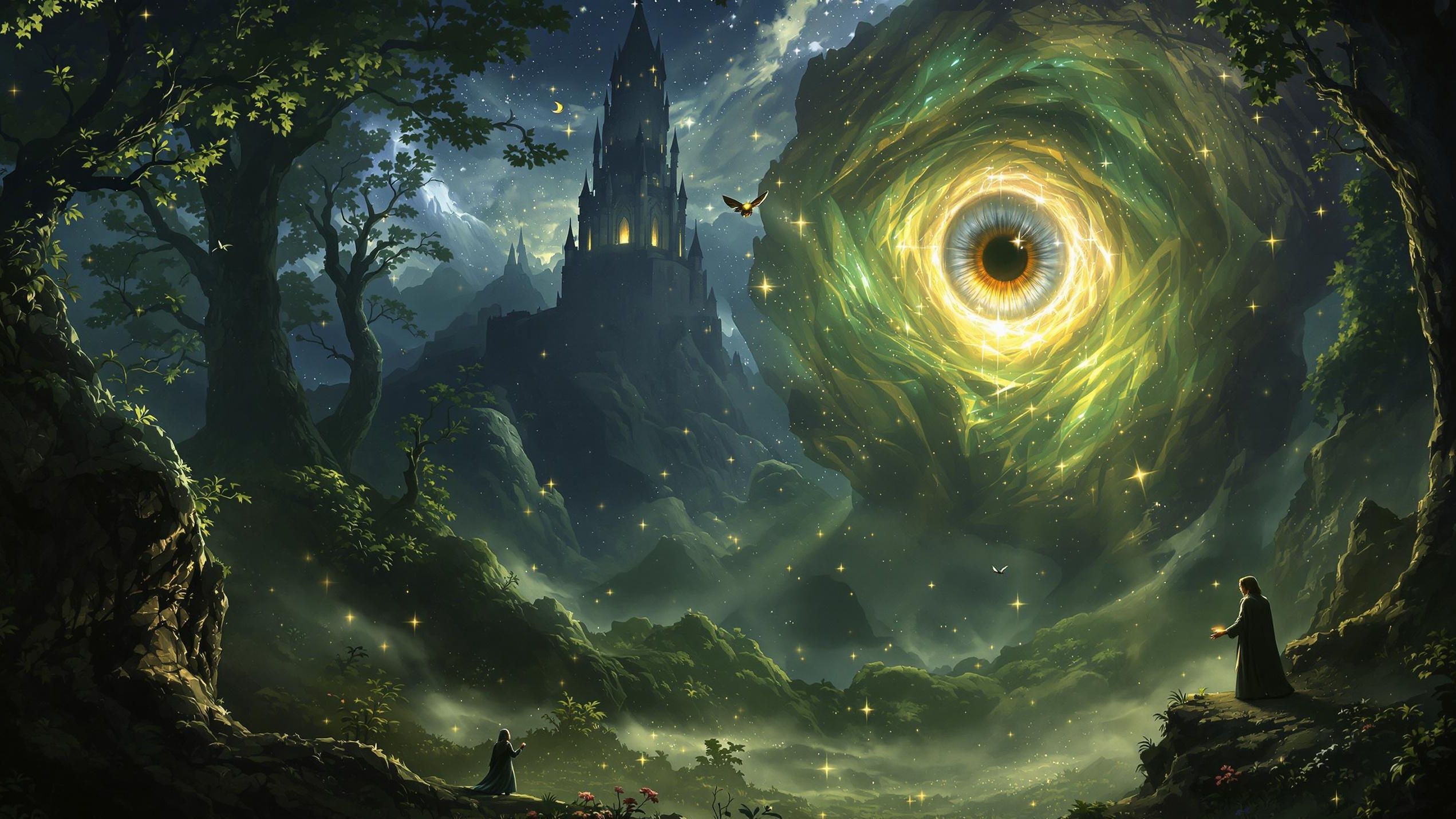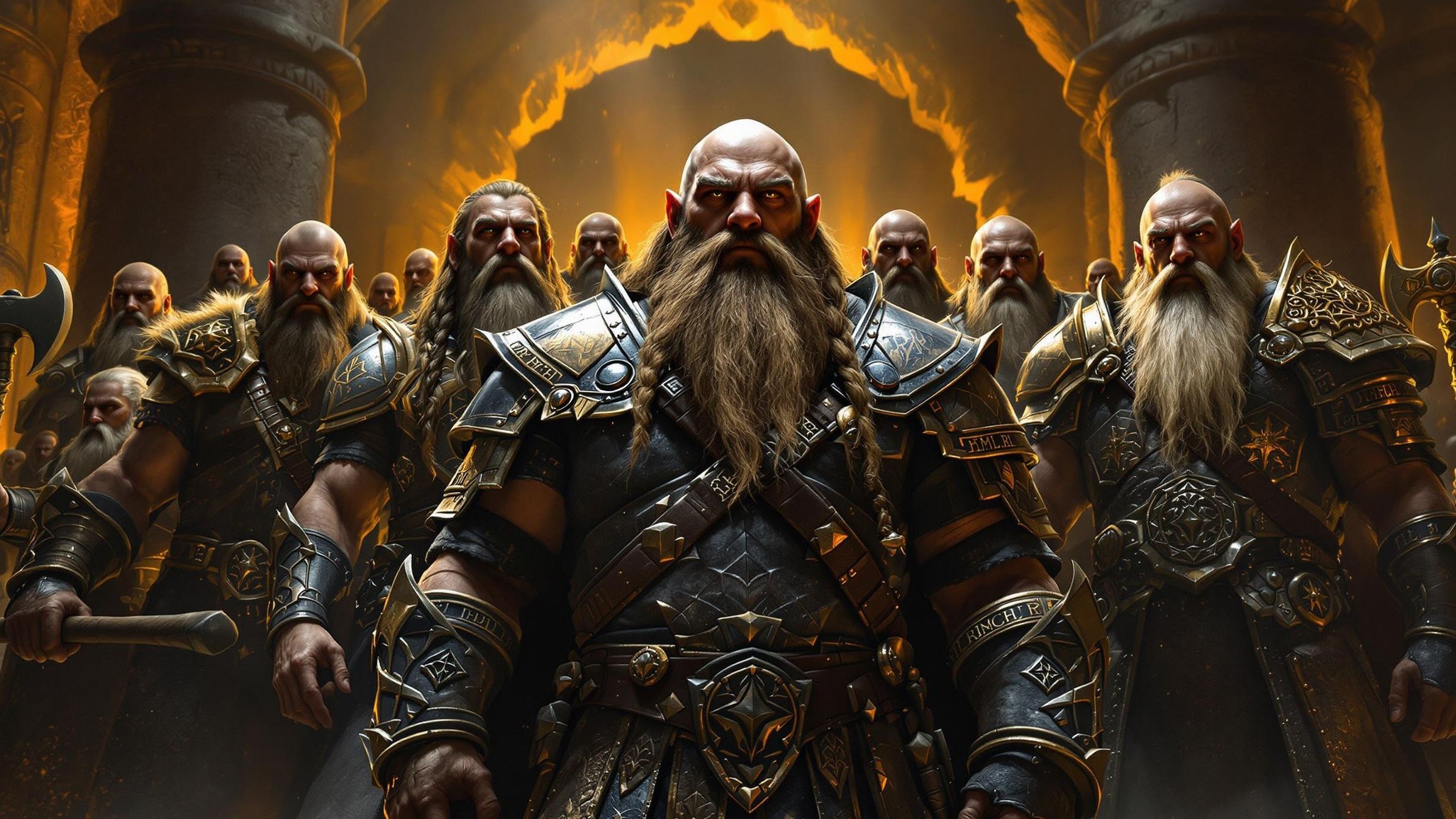Magic in Middle-earth isn’t just about fireballs and flashy explosions—it’s ancient, subtle, and deeply woven into the fabric of the world. Unlike other fantasy realms where spells are shouted and sparks fly, Tolkien’s magic often works quietly, influencing hearts, hiding truths, or bending nature itself. The most powerful beings in Arda—wizards, Elves, Maiar, and even objects like the One Ring—use magic not always to destroy, but to persuade, protect, and manipulate. This list dives into the cleverest uses of magic across Tolkien’s legendarium—moments where spells, enchantments, and arcane knowledge weren’t just powerful, but brilliantly used to alter the course of Middle-earth’s history.
#10: Gandalf Imitating Troll Voices to Cause Chaos
In The Hobbit, when Bilbo and the Dwarves are captured by three massive trolls, things look grim. Bound and bagged, the company watches as the trolls argue over how best to cook them. Enter Gandalf—who doesn’t just charge in with a blast of magic. Instead, he hides in the shadows and mimics the trolls’ voices, sowing discord until they argue so long the sun rises, turning them all to stone. This use of magic (and cleverness) is brilliant not because of its raw power, but because it exemplifies Tolkien’s version of wizardry: practical, psychological, and rooted in deep understanding. Gandalf doesn’t need to showboat; he just uses his wit, his voice, and a well-timed sunrise. It’s a moment that blends subtle spellwork with showmanship, and it’s one of the earliest signs that magic in Middle earth operates best when it’s used with cunning rather than force.
#9: Elrond’s Enchanted River Defending Rivendell
When the Black Riders chase Arwen and Frodo toward Rivendell in The Fellowship of the Ring, they are confronted by the seemingly impassable Bruinen River. Just when the Ringwraiths appear to succeed, the river swells into a flood—complete with charging horse-shaped waves—that crushes the Riders beneath it. This isn’t just a convenient natural disaster; it’s Elvish magic at its most majestic. Elrond commands the river with a spell (possibly aided by Gandalf, depending on the version), invoking the natural world as a guardian force. What makes this moment clever is how seamlessly it blends nature and magic, creating a defense that doesn’t rely on walls or soldiers but the very land itself. The illusion of horses in the water is more than flair—it’s psychological warfare against enemies who fear purity and light. It’s a reminder that in Middle earth, even the rivers can become weapons in the hands of those wise enough to wield them.
#8: Galadriel’s Mirror of Water
Deep in the heart of Lothlórien, Galadriel invites Frodo and Sam to gaze into a silver basin filled with water—the Mirror of Galadriel. It’s not a crystal ball or a scrying stone, but a pool that reveals glimpses of past, present, and possible future. The cleverness lies not in the visions themselves, but in how Galadriel uses them. She doesn’t dictate what the viewer sees or interpret the meanings directly. Instead, she lets the images speak for themselves, allowing Frodo to make his own choices. Her use of the mirror is not to control, but to counsel—a quiet persuasion that leads Frodo to better understand the stakes of his journey. This moment is pure Tolkien: magic as insight rather than interference. Galadriel’s restraint and wisdom elevate this simple act of divination into a profound turning point for Frodo’s growth. The Mirror doesn’t show absolute truths—it shows possibilities, which is far more powerful.
#7: Tom Bombadil’s Immunity to the One Ring
One of the most mysterious and debated magical moments in all of Tolkien’s work is Tom Bombadil’s indifference to the One Ring. When Frodo offers it to him in The Fellowship of the Ring, Tom puts it on… and nothing happens. He doesn’t vanish, he isn’t tempted, and he even laughs. He then hands the Ring back without hesitation. This scene is utterly baffling—and that’s the point. Bombadil, whatever he truly is, exists outside the Ring’s influence. His magic is so deeply tied to the natural order, to song, to life itself, that domination holds no power over him. It’s not flashy, but it might be the most profoundly clever magical moment in the saga. Bombadil’s immunity illustrates a greater truth: that some forms of magic, those tied to joy, earth, and harmony, exist beyond even the darkest forces. The fact that Tolkien never fully explains it only makes the moment more magical.
#6: Frodo Using the Phial of Galadriel Against Shelob
Armed with only Sting and a small glass vial containing the light of Eärendil’s star, Frodo faces one of his most terrifying foes: Shelob, the monstrous spider who lives in the tunnels of Cirith Ungol. The Phial of Galadriel is no ordinary trinket—it holds the captured light of a star, the purest magic in Middle-earth. When Frodo holds it aloft and cries, “Aiya Eärendil, elenion ancalima!” (“Hail Eärendil, brightest of stars!”), the phial shines with blinding light, driving Shelob back. What makes this moment clever is not just the power of the phial, but Frodo’s understanding of how and when to use it. He’s not a wizard, not a warrior—he’s a Hobbit with heart, who remembers the right words in the right moment. He uses ancient Elvish light, not brute force, to survive a nightmare. In a world where shadows grow thicker by the day, Frodo’s use of the phial shows that even the smallest magic, in the hands of the right soul, can hold back the dark.
#5: Gandalf Breaking Saruman’s Staff with a Word
In The Two Towers, after the Ents overthrow Isengard, Gandalf confronts Saruman at the top of Orthanc. No dramatic duel, no bolts of lightning—just a staff, a voice, and authority. Gandalf the White speaks with the quiet thunder of divine will, saying, “Your staff is broken.” Instantly, Saruman’s staff shatters in his hand. The brilliance of this moment lies in its restraint. Gandalf doesn’t raise a hand or chant an incantation—his words alone carry the weight of the Valar. This scene isn’t just about destroying a magical object—it’s a complete dismantling of Saruman’s power. Gandalf’s use of magic here is as much symbolic as it is literal. He wields justice like a spell, stripping Saruman of his rank, ego, and ability to influence. It’s an act of magic by command, not force—a divine right made manifest. Few moments in Middle earth more elegantly demonstrate that true power doesn’t need to shout; it simply is.
#4: Sauron’s Creation of the One Ring
While the Ring itself is the embodiment of corruptive power, the way Sauron made it is one of the most cunning magical feats in all of Arda. By helping Elves forge the Rings of Power and secretly crafting the One Ring in Mount Doom to control them all, Sauron turned deceit into sorcery. He didn’t need to conquer Middle-earth by brute strength—he attempted to rule it by binding its leaders to his will. It’s subtle. It’s horrifying. And it’s masterful. He infused the Ring with much of his own power, ensuring it would endure even if his body was destroyed. This magic was not about fire and fury—it was about ensnaring hearts. The Rings of Power seemed like gifts, but they were traps. Sauron’s manipulation of magic to serve control is the antithesis of Gandalf’s philosophy. His use of enchantment shows how even the most brilliant magical creation can become a tool of domination when wielded by the wrong hand. It’s the ultimate cautionary tale about cleverness without wisdom.
#3: Lúthien Singing Morgoth to Sleep
Long before the events of The Lord of the Rings, one of the most legendary tales of Middle earth involved Lúthien Tinúviel, a half-Elf, half-Maiar maiden whose magical prowess surpassed even the greatest sorcerers. In the Silmarillion, Lúthien infiltrates Angband—the fortress of Morgoth himself—to rescue her beloved Beren. What does she use to defeat the Dark Lord? Not a sword. Not a spellbook. A song. Lúthien sings a lullaby of such profound beauty and sorrow that Morgoth—first Dark Lord, corrupter of the world—is lulled into slumber. It’s a breathtaking inversion of power: a single voice triumphing over a godlike tyrant. Her magic, born of hope and light, doesn’t destroy—it disarms. This moment is not only a clever use of magic but one of the most powerful examples of art triumphing over evil in all of Tolkien’s legendarium. Lúthien’s song is proof that true magic can be found in love, in beauty, and in the courage to face evil with grace instead of wrath.
#2: Gandalf Lighting the Beacons of Gondor
When Gondor stands alone and the threat of Mordor looms large, hope seems lost—until the beacons are lit. In The Return of the King, Gandalf manipulates Denethor and engineers the lighting of the ancient beacon system, signaling Rohan for aid. While not “magic” in the traditional sense, this act showcases Gandalf’s most important kind of spell: influence. He doesn’t conjure flames with his staff (though in the books it’s suggested he may have aided the lighting). Instead, he uses timing, persuasion, and subtle pushes to orchestrate a massive, world-shifting event. The result? A signal fire that spreads across mountain ranges, uniting kingdoms in a single, flaming thread of hope. This moment reminds us that the cleverest magic often comes not from wands or staffs, but from understanding people—and knowing how to inspire them to action. Gandalf didn’t just light the beacons. He lit hope itself.
#1: Frodo Resisting the Ring—Until the Very End
The most quietly clever magic in all of Middle-earth may not even feel like magic at first—but it absolutely is. Frodo, a simple Hobbit from the Shire, carries the most powerful and corrupting object in existence for months, enduring its whispering temptations and the psychological torment it brings. He resists in fire, in darkness, and through agony. While the Ring gradually erodes his will, Frodo’s endurance is nothing short of miraculous. His ability to carry the burden for so long, to choose mercy, and to fight the Ring’s seduction as long as he did—this is a magic of the soul. Elrond himself says that Hobbits are “a remarkable people,” and Frodo’s resistance proves it. The cleverness lies not in what Frodo does, but in what he withstands. No wizard could have done it. No Elf, no king. Only Frodo. The triumph isn’t flashy—it’s moral. It’s spiritual. And in the end, it’s Frodo’s mercy toward Gollum, more than any spell or sword, that leads to the Ring’s destruction. That, in itself, may be the cleverest act of magic Tolkien ever wrote.
In a world shaped by power and prophecy, the cleverest uses of magic in Middle earth were often the quietest. Whether through song, light, subtle manipulation, or sheer moral strength, these moments reveal that Tolkien’s magic isn’t about spectacle—it’s about wisdom, restraint, and timing. The most brilliant enchantments weren’t just cast—they were felt. From Lúthien’s lullaby to Frodo’s resilience, Middle-earth’s greatest magical acts changed the course of history not with explosions, but with choices. Magic, in Tolkien’s world, is not a tool—it’s a test. And the cleverest users were those who knew when not to use it at all.




